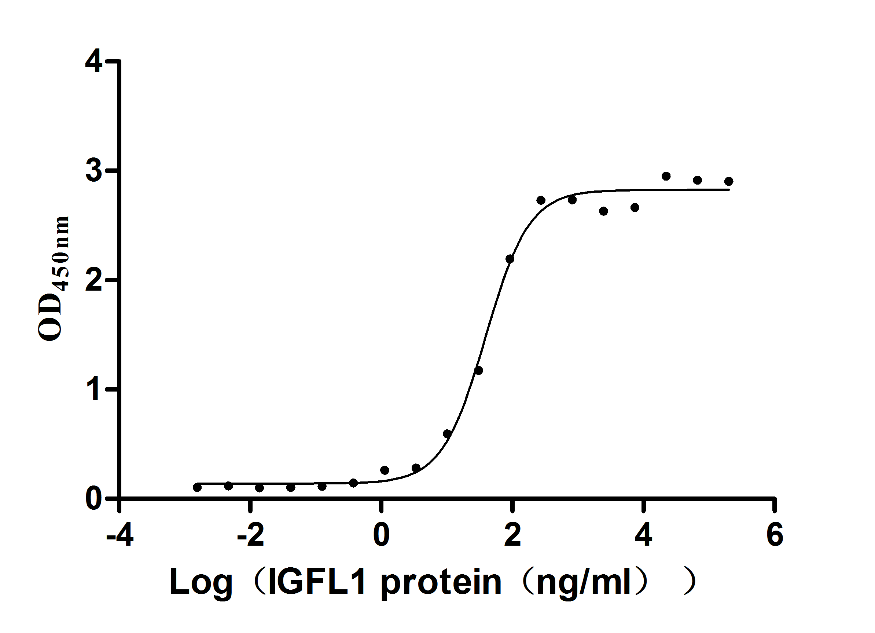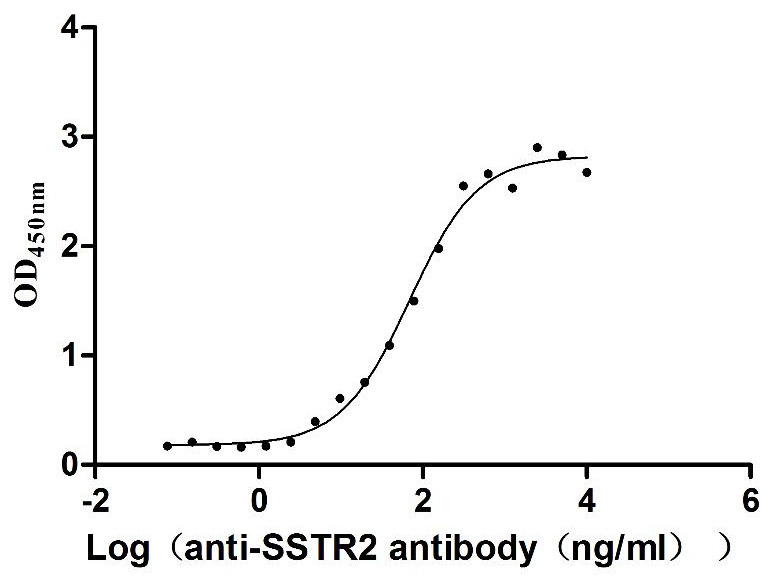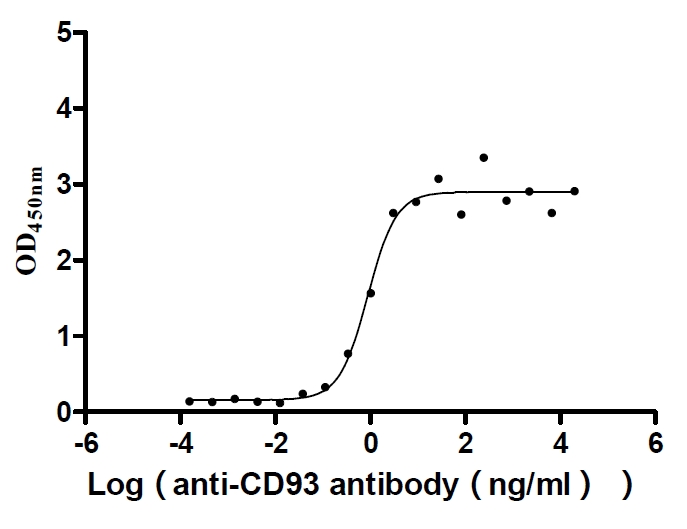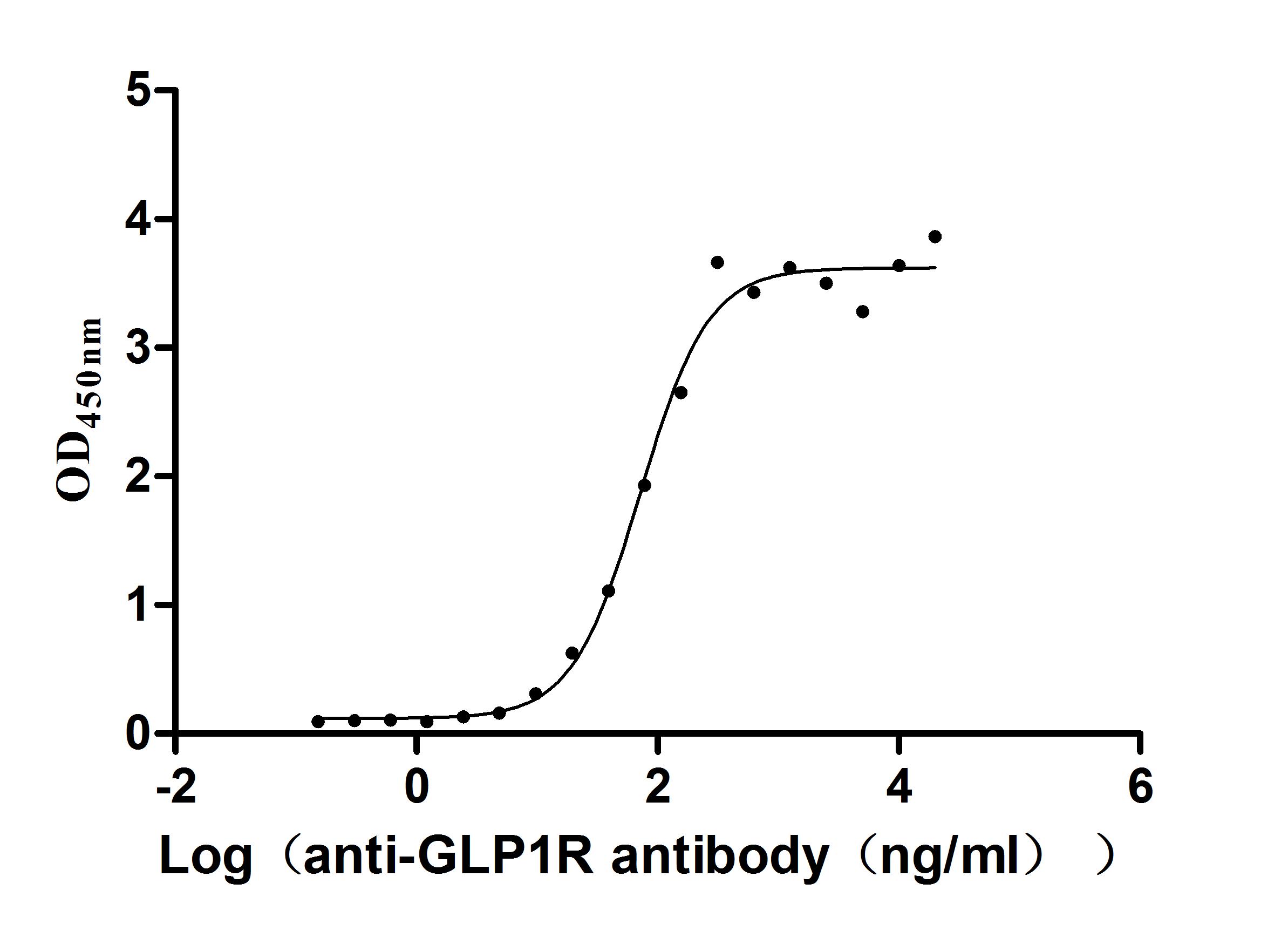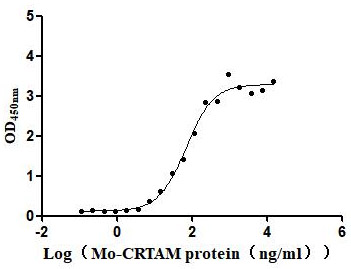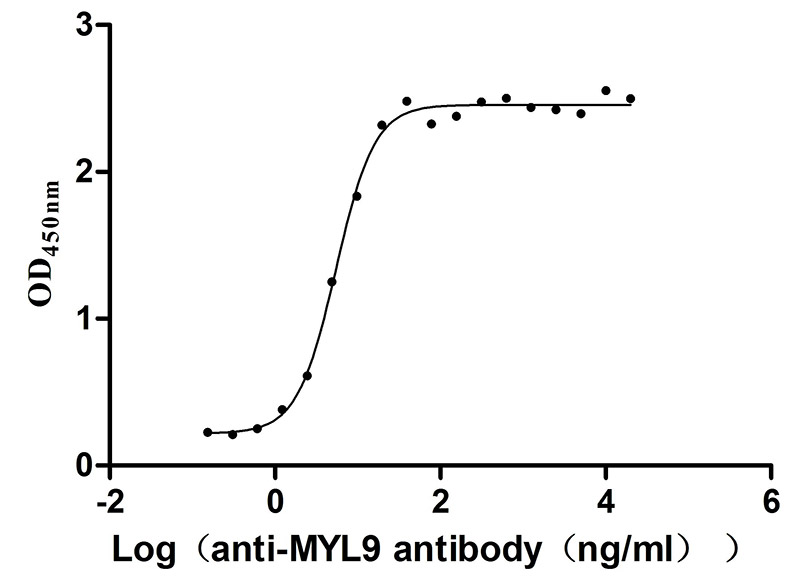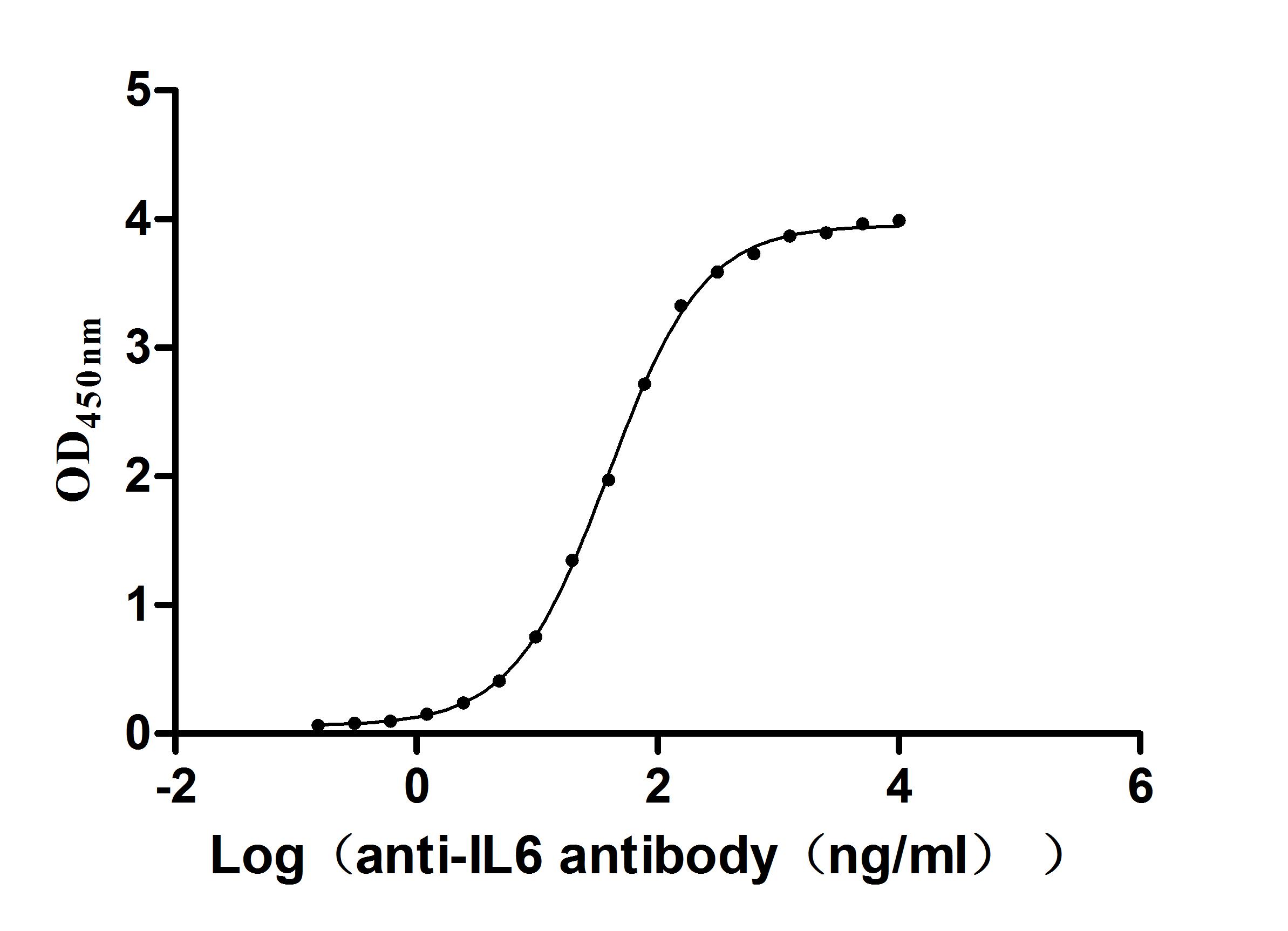Recombinant Rat Mitochondrial uncoupling protein 2 (Ucp2)
-
货号:CSB-CF025555RA
-
规格:
-
来源:in vitro E.coli expression system
-
其他:
产品详情
-
基因名:
-
Uniprot No.:
-
别名:Ucp2; Slc25a8; Mitochondrial uncoupling protein 2; UCP 2; Solute carrier family 25 member 8
-
种属:Rattus norvegicus (Rat)
-
蛋白长度:Full length protein
-
表达区域:1-309
-
氨基酸序列MVGFKATDVPPTATVKFLGAGTAACIADLITFPLDTAKVRLQIQGESQGLARTAASAQYR GVLGTILTMVRTEGPRSLYNGLVAGLQRQMSFASVRIGLYDSVKQFYTKGSEHAGIGSRL LAGSTTGALAVAVAQPTDVVKVRFQAQARAGGGRRYQSTVEAYKTIAREEGIRGLWKGTS PNVARNAIVNCTELVTYDLIKDTLLKANLMTDDLPCHFTSAFGAGFCTTVIASPVDVVKT RYMNSALGQYHSAGHCALTMLRKEGPRAFYKGFMPSFLRLGSWNVVMFVTYEQLKRALMA AYESREAPF
Note: The complete sequence including tag sequence, target protein sequence and linker sequence could be provided upon request. -
蛋白标签:N-terminal 10xHis-tagged
-
产品提供形式:Liquid or Lyophilized powder
Note: We will preferentially ship the format that we have in stock, however, if you have any special requirement for the format, please remark your requirement when placing the order, we will prepare according to your demand. -
缓冲液:Lyophilized from Tris/PBS-based buffer, 6% Trehalose, pH 8.0
-
储存条件:Store at -20°C/-80°C upon receipt, aliquoting is necessary for mutiple use. Avoid repeated freeze-thaw cycles.
-
保质期:The shelf life is related to many factors, storage state, buffer ingredients, storage temperature and the stability of the protein itself.
Generally, the shelf life of liquid form is 6 months at -20°C/-80°C. The shelf life of lyophilized form is 12 months at -20°C/-80°C. -
货期:Basically, we can dispatch the products out in 1-3 working days after receiving your orders. Delivery time may differ from different purchasing way or location, please kindly consult your local distributors for specific delivery time.Note: All of our proteins are default shipped with normal blue ice packs, if you request to ship with dry ice, please communicate with us in advance and extra fees will be charged.
-
注意事项:Repeated freezing and thawing is not recommended. Store working aliquots at 4°C for up to one week.
-
Datasheet & COA:Please contact us to get it.
相关产品
靶点详情
-
功能:UCP are mitochondrial transporter proteins that create proton leaks across the inner mitochondrial membrane, thus uncoupling oxidative phosphorylation from ATP synthesis. As a result, energy is dissipated in the form of heat.
-
基因功能参考文献:
- The present results highlight the neuroprotective actions of UCP2, acting in the inhibition of apoptotic factors and oxidative stress, to increase neuron survival after SE onset. PMID: 30159115
- These data suggested that atorvastatin significantly attenuated the myocardial remodeling by downregulating the expression of UCP2 that was found to improve the myocardial energy metabolism, inhibit myocardial hypertrophy, and eventually reduce myocardial remodeling. PMID: 29559841
- Obesity-alleviating potential of asiatic acid and its effects on ACC1, UCP2, and CPT1 mRNA expression in high fat diet-induced obese Sprague-Dawley rats. PMID: 28993954
- UCP2 inhibits myointimal hyperplasia after vascular injury, probably through suppressing nuclear factor-kappaB-dependent smooth muscle cell proliferation and migration. PMID: 29025747
- microRNA-503 significantly contributes to mediate brain UCP2 downregulation. PMID: 28640254
- The findings demonstrated that the UCP2 and NLR family-pyrin domain-containing 3/caspase 1/interleukin 1beta signaling pathway may be involved in intestinal barrier injury and that GIK treatment decreased intestinal barrier permeability. PMID: 28428961
- GLP-1 likewise increased the synthesis of GR and favored the translocation of the nuclear transcription factor erythroid 2p45-related factor (Nrf2)..Glucose-stimulated insulin secretion was also preserved in beta-cells challenged with tert-BOOH but pre-treated with GLP-1, probably through the down-regulation of the mitochondrial uncoupling-protein2 (UCP2). PMID: 26968794
- UCP2 has an apoptotic effect in beta cells via regulation of the intrinsic pathway of apoptosis in brain dead organ donors. PMID: 28222054
- These observations suggest that downregulation of UCP2 expression in the hypothermic preserved rat heart in part initiated the protective mechanism via the SIRT1 pathway. PMID: 27356851
- study showed that the expression of UCP2 varies according to age and the severity of obesity and supports the widely held notion that increased UCP2 expression is an adaptive response to increased fatty acid beta-oxidation and reactive oxygen species production that occurs during obesity PMID: 26621256
- In the lungs and the spleen of rats with a chronic alcohol diet cytochrome c release from mitochondria was significantly increased. Both organs did not show any altered gene and protein expression of UCP-2. PMID: 26664262
- The expression level of UCP2 is closely correlated with mitochondrial injury in sepsis rat model. PMID: 26903064
- The iPLA2gamma/UCP2 synergy provides a feedback antioxidant mechanism preventing oxidative stress by physiological fatty acid intake in pancreatic beta-cells, regulating glucose-, fatty acid-, and redox-stimulated insulin secretion. PMID: 25925080
- data demonstrate that mitochondrial morphology and funtion are damaged in cardiomyocytes under septic conditions, while the silencing of UCP2 using siRNA aggravated this process PMID: 25873251
- propose mitochondrial uncoupling protein-2 manipulation as a potential strategy for redirecting microglial response towards protective phenotypes PMID: 26173855
- The aim of this study was to investigate the early changes of cardiac uncoupling protein-2 (UCP2) expression following myocardial ischemia reperfusion in rats chronically treated with ramiprilat and losartan. PMID: 23372044
- Indoxyl sulfate-induced cardiomyocytes hypertrophy was partly due to the inhibition of AMPK/UCP2 signaling and the enhancement of oxidative stress. PMID: 25703824
- Vitamin D deficiency decreases adiposity in rats and causes altered expression of uncoupling proteins and steroid receptor coactivator3 PMID: 25132457
- Chronic alcohol consumption leads to a cerebral induction of UCP-2 (and UCP-4). PMID: 23800309
- miR-30e/UCP2 axis has an important role in mediating TGF-beta1-induced epithelial-mesenchymal transition and kidney fibrosis. PMID: 23515048
- The expression of SIRT1 is significantly lowered and UCP2 increased in the liver of rats with T2DM and NAFLD. PMID: 22588935
- Expression of hippocampal UCP2 increases 12 to 48 hours after status epilepticus is induced. PMID: 22849356
- Resveratrol up-regulates hepatic UCP2 expression and prevents the development of nonalcoholic fatty liver disease in a high-fat diet-treated rodent model. PMID: 23084643
- UCP2 is a critical protein to prevent oxidative stress damage in renal mesangial cells in vitro. PMID: 23297375
- Pingtang recipe containing drug-serum shows a protective effect on INS-1 beta pancrentic cells against lipoapoptosis by regulating ROS production and UCP-2 expression. PMID: 21179742
- blockade of the diabetes-induced upregulation of UCP- 2 results in excessive uncoupling and reduced oxidative stress in the kidney via activation of ANT. PMID: 22768304
- After vagotomy, ATP contents decreased and UCP2 expression was downregulated in the stomach corpus. PMID: 21162199
- UCP2 mRNA expression in the hypothyroidism group was significantly lower than that of control group. PMID: 21190599
- The expression of UCP2 mRNA in the liver failure group was higher as compared to the control group. Expression may be related to levels of SOD, MDA and endotoxin. PMID: 21272461
- Ucp2 and PPARdelta gene and protein expression increased in rats fed a fructose-rich diet. PMID: 21855553
- Berberine can down-regulate the expression levels of UCP2 mRNA and UCP2 proteins of hepatic tissue in non-alcoholic fatty liver disease rats. PMID: 21359922
- UCP2 plays both regulatory and protective roles in beta cells by acutely lowering glucose-stimulated insulin secretion and chronically preventing oxidative stress. PMID: 21172424
- The frequency of beta cell apoptosis in high-fat feeding rats is affected by oxidative stress, which results in increasing UCP2 gene expression. PMID: 20014488
- UCP2 expression is rapidly induced via the peroxisome proliferator-activated receptor pathway, thereby increasing cell apoptosis in adult rat cardiomyocytes. PMID: 20010438
- The expression of UCP2 was upregulated in pressure overload induced failure heart and might be responsible for decreased myocardial adenine nucleotide and energy metabolism disturbance. PMID: 20193183
- PGC-1alpha is induced by cerebral ischemia leading to upregulation of UCP2 and SOD2, thereby providing a neuroprotective effect against ischemic brain injury in the hippocampus by ameliorating oxidative stress PMID: 19774674
- induced by long-term cold exposure, promoting decoupling of oxidative phosphorylation PMID: 11710805
- UCP-2 mRNA is induced by fatty acid oxidation in beta-cells PMID: 11897694
- energy metabolism and expression of uncoupling protein 2 in brown adipose tissue after 21 days of recovery from intracerebroventricular mouse leptin in rats PMID: 12062312
- superoxide (or its products) exerts its uncoupling effect by activating the proton transport mechanism of UCP2 at the matrix side of the mitochondrial inner membrane PMID: 12372827
- The down-regulation of heartUCP2 parallels the lower lipid utilization which may account for an enhanced fat deposition in dietary obese rats PMID: 12435081
- Thiazolidinediones indirectly stimulate ucp2 transcription by inducing-via PPARgamma-limiting amounts of a protein, which must be phosphorylated by MAPK to stimulate the gene. PMID: 12588051
- Triiodothyronine selectively enhances transcriptional stimulation of ucp2 by thiazolidinediones and nonselective PPAR ligands by priming the gene to a transactivating signal(s) generated by such ligands. PMID: 12588052
- Effects of dietary protein content on uncoupling proteins (UCP) 1, 2 and 3 expression in various tissues of Zucker lean and obese rats were studied PMID: 12603007
- induction of electrogenic ion transport rather than electrophoretic fatty acid activity induced expression of hepatic uncoupling protein 2 (UCP-2) in rats PMID: 12756242
- data argue against the hypothesis that UCP-2 causes decreased cardiac mechanical efficiency in septic shock PMID: 12785014
- Data suggest that uncoupling protein-2 is an inducible protein that is neuroprotective by activating cellular redox signaling or by inducing mild mitochondrial uncoupling that prevents the release of apoptogenic proteins. PMID: 12858170
- Down-regulation of UCP-2 mRNA by IL-1beta is an early event of cytokine interaction with beta-cells which is not directly coupled to cell toxicity. PMID: 12967645
- UCP2 appears to be regulated by the excitatory stimulus via the cAMP-PKA cascade and serves to negatively control the synaptic output by reducing intracellular ATP levels PMID: 14511123
- Sympathetic sympathetic tonus generated by exposure of rats to cold induces the expression of PGC-1, which participates in the control of UCP-2 expression in pancreatic islets. PMID: 14576981
显示更多
收起更多
-
亚细胞定位:Mitochondrion inner membrane; Multi-pass membrane protein.
-
蛋白家族:Mitochondrial carrier (TC 2.A.29) family
-
组织特异性:Expressed in a variety of organs, with predominant expression in the heart, lung and spleen.
-
数据库链接:
KEGG: rno:54315
STRING: 10116.ENSRNOP00000024156
UniGene: Rn.13333
Most popular with customers
-
Recombinant Human IGF-like family receptor 1 (IGFLR1), partial (Active)
Express system: Mammalian cell
Species: Homo sapiens (Human)
-
Recombinant Human Somatostatin receptor type 2 (SSTR2)-VLPs (Active)
Express system: Mammalian cell
Species: Homo sapiens (Human)
-
Recombinant Human Complement component C1q receptor (CD93), partial (Active)
Express system: Mammalian cell
Species: Homo sapiens (Human)
-
Recombinant Human Glucagon-like peptide 1 receptor (GLP1R), partial (Active)
Express system: Mammalian cell
Species: Homo sapiens (Human)
-
Recombinant Mouse Cell adhesion molecule 1 (Cadm1), partial (Active)
Express system: Mammalian cell
Species: Mus musculus (Mouse)
-
Recombinant Human Myosin regulatory light polypeptide 9 (MYL9) (Active)
Express system: Yeast
Species: Homo sapiens (Human)
-
Recombinant Human Dipeptidase 3(DPEP3), partial (Active)
Express system: Mammalian cell
Species: Homo sapiens (Human)
-


